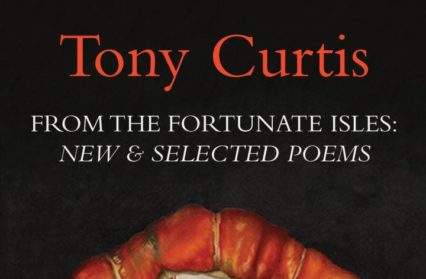From the Fortunate Isles: New & Selected Poems by Tony Curtis; Glyn Edwards offers an insightful review of this unique and personal collection of poetry.
This book gives accommodation to five decades of Tony Curtis’ career in literature. Selected poems from ten collections are housed adjacently, with forty new poems, building ‘From The Fortunate Isles’, Curtis’ latest project, abutted at the gable end. Here is a terrace of verse, akin to a loop of sea-staring houses strung along a Pembrokeshire shore; multifarious in tone, diverse in size, unique in structure, this is a collection, ‘where the light and summer sings’.
Within clearer, more prevalent themes of Curtis’ verse – South West Wales, identity, war, his father – there are subtly similar features. Two poems from the 1983 collection Letting Go, ‘The World’ and ‘Tortoise’, ponder the concept of legacy. ‘Tortoise’, the sole narrative poem in the book, recounts the discovery of an errant hibernating pet in a neighbour’s loft:
Just that. A shell, hard, perfect and whole. Inside, a shrunk ball of jelly.
Tony Curtis reflects on the grotesque image that begins to take residence, like the tortoise itself, ‘lodged in the back of the mind’ until he is prompted to question the bleakness of a predestination, where a body can be outlived and made redundant by its skeleton:
to travel and come to nothing
On the page parallel is ‘The World’, which announces its portentous subject in the opening line, ‘this is how it ends’ before almost listing the cataclysmic events that occur as humanity recedes: ‘Russian subs…acid air…fire…the Third World / eats itself and starves.’ The final stanza delivers mankind back to its origins and to a fearful inheritance:
And farther out floating
towards them on a floe
a man, a woman and a child waving
spears
Half a lifetime ago, Tony Curtis was a lecturer of mine at university. In one workshop, he spread images of John Digby over the wide table and encouraged his undergraduates to address the surreal collages. ‘There are two ways of looking at a thing’, he implored. Six of these artworks, ornately decorated Moorish doorways used as window frames looking out to terrain populated by Grecian figures, dinosaurs, lighthouses, Victorian bathers, are aligned with their respective poems from the 1998 collection ‘The Arches’. ‘XXII’ concludes with a stanza on the duplicity of language:
This was ever the way –
from the high clarity
the waves of confusion
turn into the words
that lead us astray.
A piece of advice I recall from Curtis’ teachings was the need ‘to always begin strongly and end strongly’; he prized the first and final lines of a poem more than any others. Thumbing through the two hundred and fifty pages of this book, it is clear that Curtis’ adheres emphatically to his own precept. The thirteen poems taken from ‘Preparations’ are particularly charmed with resolutions of momentous, pacing, funereal sadness.
We turn our backs on a sky that goes on forever.
(Return to the Headland)
…our dead friends and fathers,
on the road, at the desk, looking over our shoulders.
(Poem for John Tripp)
Under the sun, the prodigal sky,
there are no healing waters.
(My Father in Pembrokeshire)
Of the forty poems from the eponymous collection, ‘From the Fortunate Isles’, many are observational, many are elegiac. The title poem is languid and ambling and warmly reveals an encounter with street vendors and performers in the Canary Islands. Against a theatrical drop of a menacing and rough Atlantic sea, Tony Curtis experiences a hiatus and a temptation to ‘let loose of it all’. The title of the poem, an allusion to a classical myth about idyllic islands reserved for favoured or blessed mortals, is slightly ambiguous: it is a simple reference to geography; it is hyperbolic in Curtis’ appreciation of holiday paradise; it is an acknowledgement to the artists and writers that both the poet and the collection mourns.
Elegies to the landscape painters Peter Prendergast and John Knapp-Fisher, to the poets Dannie Abse and Dylan Thomas, to the memory of his father, to personal friends, usher in the reflective mood and, once more, the theme of legacy:
if my ashes were emptied out here.
(Wanting Choughs)
Start strongly and finish strongly; the final poem of the book, ‘Seamus on the Tube’, does exactly that. Reading Heaney’s poem ‘The Railway Children’ amongst a train filled with commuters ‘looking away, not looking away’, the narrator of the poem becomes mesmorised by their own escaped nostalgia. Although it is written in second person narrative, it seems safe to assume the poem is autobiographical and consequently, safe to assume, from the final words of the final poem, that Tony Curtis is content with all that he has built; serene in his legacy.
Reaching Warren Street, you’ve read it
Four or five times, absorbed the innocent wisdom
And sense of the thing. Those people opposite
See a crazy old man mouthing words, appearing to sing.
Glyn Edwards has been described as ‘one of Wales’ most exciting new voices’. His first collection Vertebrae was published by the Lonely Press.











